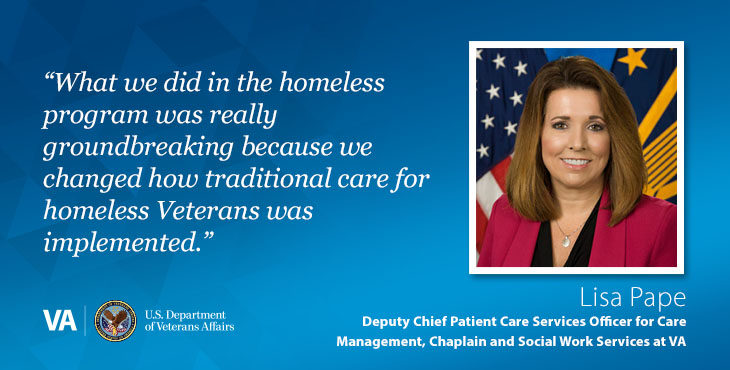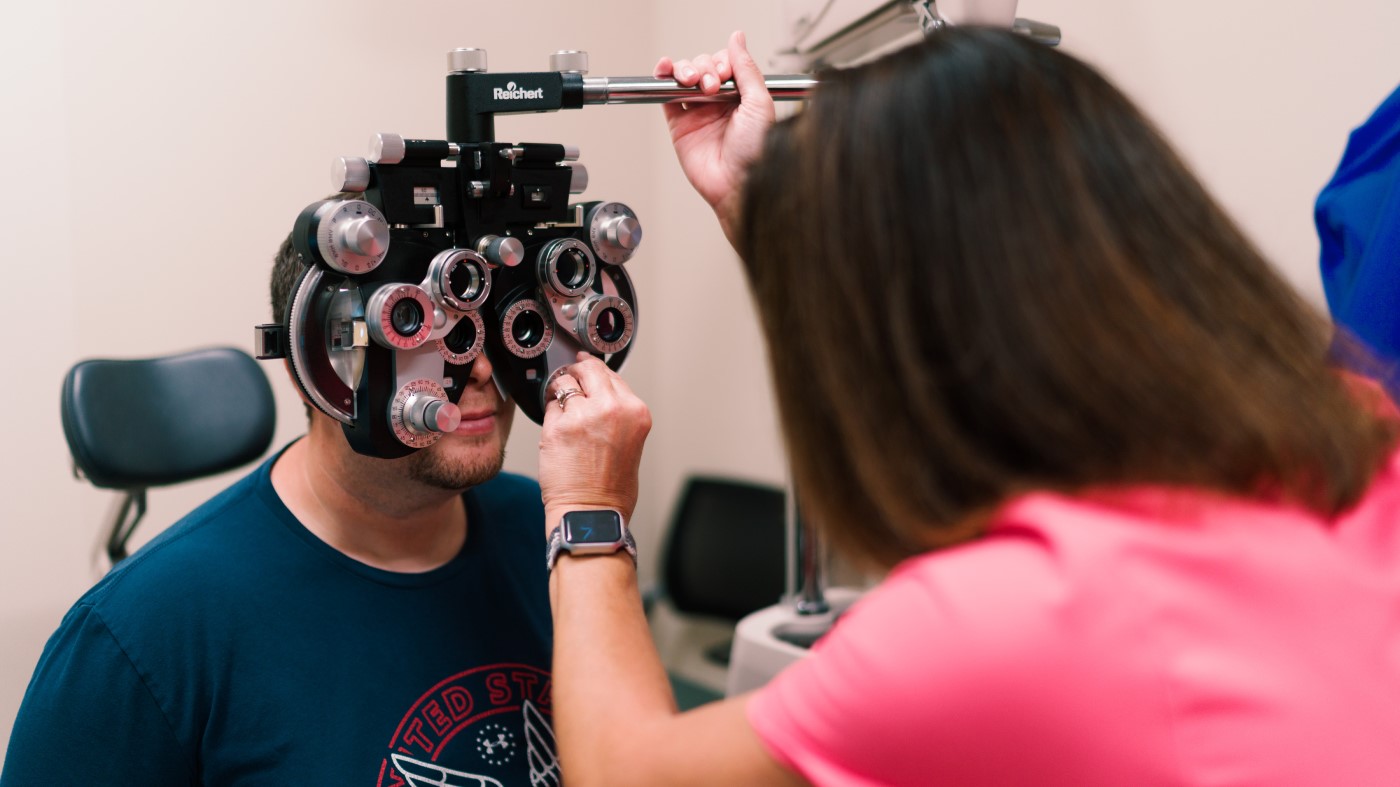In her nearly 30-year career at VA, Lisa M. Pape, MSSA, LISW, has never said no to a new challenge.
Pape directed the national office for mental health residential rehabilitation treatment programs for Veterans. She served as senior adviser to the VA’s Deputy Under Secretary for Health for Policy and Services. She led VA’s homeless programs office for six years, helping VA and the nation achieve a nearly 50% reduction in homelessness among Veterans. Along the way, Pape has earned numerous achievement and service awards, including a Presidential Rank Award, bestowed to just 3% of career Senior Executive Service (SES) professionals.
Now, Pape is more than one year into her next challenge as Deputy Chief Patient Care Services Officer for Care Management, Chaplain and Social Work Services. She leads more than 15,000 master’s prepared social workers, nearly 1,500 graduate-level social work trainees, 700 chaplains and approximately 150 chaplain trainees. She also leads the Caregiver Support Program, Intimate Partner Violence Program and Transition and Care Management Program. These workers and programs provide compassionate care to Veterans and caregivers at VA medical centers and outpatient clinics nationwide.
In this installment of our #ChooseVALeadership Careers blog series, Pape talks about her career trajectory, and why she’s convinced that anyone can improve the way VA delivers services to Veterans.
What is your primary job at VA?
My day to day is serving as the executive lead for all things social work, all things chaplain and all things care management. This includes helping military personnel move from active duty to civilian life with education, healthcare, skills training and employment. We also provide a continuum of services for caregivers of Veterans who are seriously ill.
What was appealing about a career at VA?
I wanted to be a social worker and always knew I wanted to be in hospital social work. Back in 1990, through my graduate school, I received a stipend for a social work internship at VA. It was the best career choice I ever made.
I started in the homeless program doing direct patient care and progressively moved up into managerial jobs. I spent about 16 years in Cleveland running the VA homeless program there and then came to VA headquarters in Washington, D.C., where I eventually became the SES for homeless programs.
VA has been a great pool of opportunity for me and, I think, for social workers in general. There’s no better mission, serving those who have put themselves in harm’s way.
What I excel at is being a change agent and setting up operations. What we did in the homeless program was groundbreaking because we changed how traditional care for homeless Veterans was implemented. Traditionally, we treated a Veteran who was homeless in the hospital, taking care of issues such as mental illness or substance use. After they addressed those issues, we would help the Veteran find a job and housing. It was a linear process.
We changed that paradigm. Veteran after Veteran would tell us they couldn’t even think about addressing health and mental health issues if they didn’t have a place to sleep. So, we partnered with the U.S. Department of Housing and Urban Development. They provided vouchers so that Veterans could get housed first, and then receive help from VA with other issues. We did that, and we decreased homelessness by 49% in the six years I was director of that office.
What is the most rewarding part of your job?
It’s really knowing that we are improving the lives of those less fortunate than ourselves. I realize how cliché and how corny that sounds, but it is what drives me. Because I believe that — that the Veteran in need could be our loved one. And we would not want anything but the best for our loved one. I just place myself in that Veteran or that family member’s shoes.
What do you find surprising about working at VA?
I do think there’s a misconception that you can’t change things. I’ve found that if you have courage and persist, you can make a real difference. Leaders want to hear from employees on what can be done better, which ultimately improves services for Veterans.
What would you tell others considering a career at VA?
For those exploring social work, VA not only has a nice pay scale but has tons of diversity and opportunities. We pay social workers more than most nonprofits pay, and we offer a wide range of practice in health, mental health, community health, management and leadership roles. There are also opportunities at VA for talented people regardless of degree. I started as a social worker — as a trainee — and am now a senior leader. That’s a career progression almost unheard of in the private sector. And the VA programs for professional development are second to none.
What do you hope to do next?
With the implementation of the MISSION Act, we have an opportunity to improve VA’s caregiver program. We are driven to make this a better system for caregivers of Veterans who served in any era. Right now, we only serve the post-9/11-era Veterans. This gives us the opportunity to now provide some additional help to the aging Veteran and caregiver population. I can’t wait to see what we do!
Choose VA today
- EXPLORE VA careers in social work and mental health.
- INQUIRE about a mental health career at VA here.
- CHOOSE VA at VAcareers.va.gov.
- TAKE ACTION: Veterans who are homeless or at imminent risk of becoming homeless can call or visit their local VA medical center or Community Resource and Referral Center where VA staff are ready to help. Or call 1-877-4AID-VET (1-877-424-3838) to access VA services.
Topics in this story
More Stories
Whether it’s access to the great outdoors or a calmer pace in your everyday life, you can find it in rural VA communities around the country.
We offer some quick and easy steps to show you how to format a cover letter, and what information to include.
The eye care provided by ophthalmologists can make all the difference to our Veteran patients.






Well, I am A Veteran, developed a product that would assist Veterans in hands rehabilitation injuries, call the WINGBACK CELLULAR. Chair, to seat your phone Hand free, a PREVENTION mimium phone overheating. A Veteran Helping Veterans.
i think the patient advocates in broward county florida miami florida needs to be switch around because they are too close to the other employees get rid of there boss
Yall said yall are helpin with mental health then why is so hard to see a psychologist i have been tryin to see some1 at austin texas va for over 3 months they tell me excuse after excuse not enough docs , cut backs, we will send you put nothing plz help thank you
I think you need to weed out alot of doctors that dont do there job right to the veterans receiving care. You go to a appt doctors steer into computer never make eye contact or even hear what you concerns are
I need help with getting my hearing aids adjusted. The right one is fine but I cannot hear clearly with the left one. The VA in Mobile Al., tells me that they are not needing to be adjusted, that I just need to wear them. If I can’t hear clearly with them both, there is no need for me to wear them. I need help with this matter.